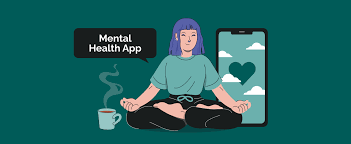🧠 Mental Health App Development: A Guide to Building Compassionate Tech
In today's fast-paced digital world, mental health has become a pressing concern. As awareness grows, so does the demand for accessible and supportive tools—especially mobile apps. Mental health app development have emerged as powerful allies, helping people manage stress, anxiety, depression, and other mental health challenges from the comfort of their phones. But developing an app in this space isn’t just about coding—it’s about empathy, privacy, and evidence-based design.
This blog explores what it takes to develop a successful mental health app—from essential features to compliance, design principles, and best practices.
🧭 Why Build a Mental Health App?
The global mental health market is expected to grow significantly, with millions turning to mobile apps for therapy, mindfulness, and emotional support. Apps like Headspace, Calm, and BetterHelp have demonstrated that well-designed solutions can scale access to care and reduce stigma.
Key Benefits of Mental Health Apps:
-
24/7 accessibility
-
Reduced costs vs. traditional therapy
-
Anonymity for users
-
Scalable support for underserved populations
-
Personalized tracking and self-care tools
🛠️ Core Features of Mental Health Apps
When designing a mental health app, focus on creating a safe, engaging, and effective environment for users. Here are some must-have features:
1. Self-assessment Tools
-
Mood tracking
-
Anxiety or depression scales
-
Journaling and reflection prompts
2. Guided Therapy & Exercises
-
CBT-based techniques
-
Breathing and relaxation guides
-
Meditation and mindfulness sessions
3. AI Chatbots or Human Counseling
-
Chatbots for basic support and check-ins
-
Integration with licensed therapists for live sessions
4. Reminders & Notifications
-
Daily mental health tips
-
Routine-building prompts
5. Progress Tracking
-
Visual dashboards to show improvements or patterns
6. Community Support
-
Forums or peer support chat (moderated for safety)
🔐 Privacy and Compliance Considerations
Mental health apps deal with deeply personal data, so privacy must be a top priority.
Legal & Ethical Standards:
-
HIPAA (U.S.)
-
GDPR (Europe)
-
PIPEDA (Canada)
Best Practices:
-
Use secure authentication (2FA)
-
Store data with encryption
-
Allow data export and deletion
-
Be transparent in terms and privacy policies
🎨 Designing with Empathy
Good UI/UX design in a mental health app goes beyond aesthetics—it fosters trust, safety, and engagement.
Design Principles:
-
Calm color palettes (soft blues, greens)
-
Minimal clutter to reduce cognitive load
-
Easy navigation
-
Inclusive and diverse content
-
Accessible to users with disabilities (WCAG compliance)
🤖 Technologies and Tools
Depending on the app type and target audience, here’s a tech stack to consider:
-
Frontend: Flutter, React Native, Swift (iOS), Kotlin (Android)
-
Backend: Node.js, Firebase, Django, Ruby on Rails
-
AI & NLP: OpenAI, Google Dialogflow, IBM Watson
-
Analytics: Mixpanel, Amplitude, Google Firebase
-
Security: OAuth 2.0, HTTPS, AES encryption
📈 Monetization Models
Monetizing mental health apps should be done with care. Here are ethical models:
-
Freemium: Basic access for free; premium for extra features
-
Subscription: Monthly/yearly plans
-
Donations or Grants: Especially for nonprofit models
-
In-App Purchases: For additional content (journals, exercises)
Avoid aggressive upselling or restricting critical features behind paywalls.
🧪 Validating and Testing the App
Testing a mental health app involves more than just bug fixing. It requires ensuring clinical effectiveness and user safety.
-
Beta testing with real users and mental health professionals
-
Surveys and interviews to gather emotional feedback
-
A/B testing features for usability improvements
-
Clinical partnerships for credibility and insights
🌍 Examples of Successful Mental Health Apps
-
Calm – mindfulness, meditation, sleep stories
-
Talkspace – therapy with licensed professionals
-
Moodpath (now MindDoc) – mood tracking and guided insights
-
Sanvello – CBT-based support with journaling and community
🧩 Final Thoughts
Mental health app development is more than a technical endeavor—it's a chance to make a real difference in people's lives. Building tools that are ethical, secure, and emotionally intelligent requires input from developers, designers, clinicians, and most importantly, users.
If you're building a mental health app, center empathy in every decision. With the right foundation, your app can be a powerful force for good in the lives of millions.
Need help developing a mental health app? Whether you’re a startup or healthcare provider, let’s talk. I can help with strategy, design, and development that puts people first.



